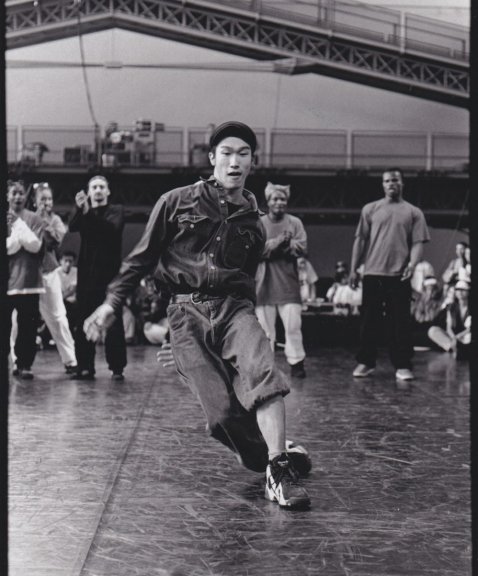5.12.25 — 10:00
Salle Boris Vian, La Villette
Modes of Transmission, Evolving Tendencies, and the Need for Archives Covering the History of hip hop Dance in Central Africa: The Case of Cameroon
10:00 – 35 min.
by Eugène Christophe Njock Belomo
From back when VCR ownership was reserved for the bourgeois elite to the omnipresence of the digital in our current era, accessing good information has been a treacherous journey for hip hop dancers in Cameroon. In 2025, many of the glorious tales of the culture’s past are still the work of myth and imagination. Aside from the oral accounts of living witnesses, many of these street legends left few material traces of their past behind them. Today, local “generation Z” dancers are finding solutions that afford new ways of marking this history. Through participant observation, documentary research, and oral interviews, this paper thinks about the durability of hip hop dance histories in Cameroon. The research especially focuses on hip hop culture ways of life in central Africa.
Making the hip hop Body (Un)Political: Breaking Pioneers, Embodied Knowledge, and Public Space in Brussels during the First Wave (1980s – early 1990s)
10:35 – 35 min.
by Rustam Khan
While historiography has long demonstrated the popularity of American hip hop among minoritized youth in Europe during the 1980s, few conversations have asked how different media structured engagements with social questions of in/exclusion from the national body politic. Unlike the lyrical character of rap transmitted through radio and TV shows, breaking culture demarcated itself through its non-verbal forms of learning and exchange taking place in physical settings (e.g. the cypher, the nightclub). In this paper, I discuss how early Belgian breaking pioneers created the foundation of communal learning primarily during the 1980s and early 1990s. I highlight how recurring themes such as the importance of crew identity, cypher codes, and the lineage of breaking styles became the foundation of a culture reacting against anti-immigrant sentiment in Belgium’s (post)colonial climate.
Subaltern Knowledge in Breaking: Migration and Difference Between the Hip hop Scenes of Mexico City and Barcelona
11:10 – 35 min.
by Carlos Gilberto Peña Hernandez
The impact and global development of breaking and hip hop dance has not been homogeneous or synchronized across the various countries that have embraced it. The differences and inequalities in the competition for knowledge within hip-hop culture are closely linked to the material conditions available to individuals to adapt them to their environment and context. These issues become more complex when migration processes introduce nuances such as situated knowledge (Haraway, 1988), the coloniality of knowledge (Mignolo, 2003), and border thinking (Anzaldúa, 1987). Starting from these considerations, this presentation proposes some reflections on the differences and asymmetries in the appropriation of knowledge (Rose, 1994; Forman, 2002) related to breaking dance between Mexico City and Barcelona, based on a migratory experience.
Dancing resistance? Postcolonial narratives and emotional practices of Rotterdam’s hip hop dancers
11:45 – 35 min.
by Jelena Beocanin
This paper explores hip hop dance in Rotterdam as a reflexive and critical engagement with hip hop culture and postcolonial urban life. It approaches dance as an emotional and intellectual practice that produces knowledge of (1) the self, (2) history (urban, diasporic, oral, and written), (3) embodied knowledge of forms, styles, techniques, emotions, and movement, and (4) lived or inherited understanding of socio-political inequalities, but also of joy, spiritual uplifting, creativity, and resistance. Framed within context of postcoloniality, the paper calls for renewed ways of understanding resistance and critical oppositionality in hip hop culture. It challenges logocentric approaches by centering dance and emotion, highlighting the emotional practices and (counter)narratives expressed through both dancers’ embodied performance and oral accounts of dance practice.
Panel discussion
Dancing social justice: counter-spaces and hip hop's critical memories
14:00 — 75 min.
by Anaïs Henneuse
with Jelena Beocanin, Rustam Khan, Venla Järvensivu and Khoudia Touré
Dynamics of inclusion and exclusion, reflecting 1980s American structural inequalities and the battles waged to overcome them, run through hip hop dances since their very emergence. Today, these dances continue to serve as powerful tools of social and political transformation in various contexts. This roundtable explores the ways in which hip hop dances get deployed to interrogate, subvert, and reconstruct normative spaces. From Senegal to Belgium, Finland to the Netherlands, this panel’s speakers will share how their dance practice helps them produce knowledge and critique, activate memory and resistance, redefine community under the erasure of colonial violence, transform carceral spaces into sites of empowerment, and create forms of corporeal disobedience. With Anaïs “Nan’s” Henneuse serving as roundtable moderator, this encounter brings together the cross-cutting perspectives of Khoudia Touré, Rustam Khan, Venla Järvensivu and Jelena Beocanin, between first-hand experience and research, to think together about the political potentialities of hip hop dance.
- Préprogramme — Colloque international 2025 pdf 885.3 kB
